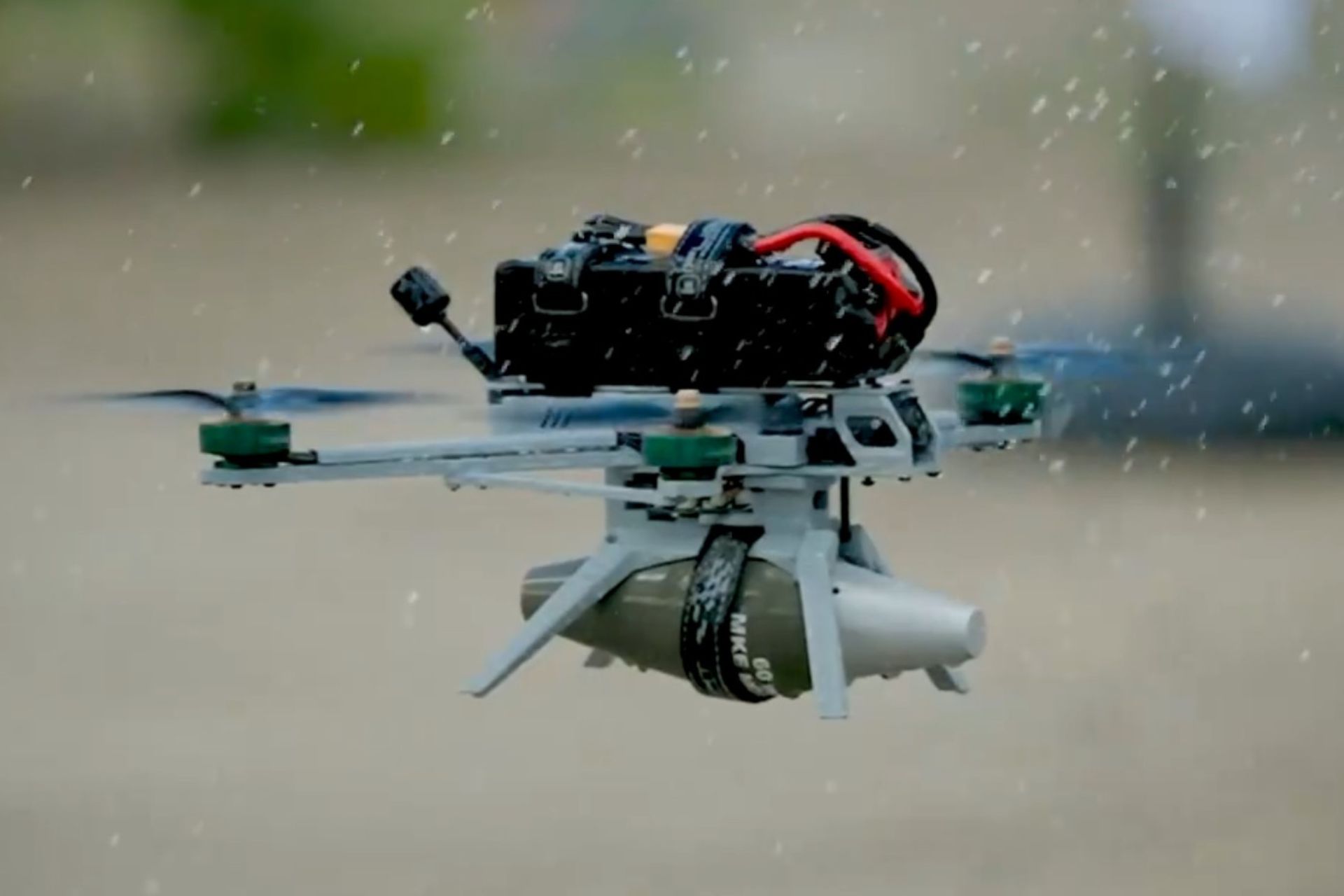Türkiye Develops an Armor-Piercing Version of MERKÜT Drone to Counter Armored Threats

{loadposition bannertop}
{loadposition sidebarpub}
On February 4, 2025, Anadolu Agency announced that Türkiye had expanded its drone capabilities with the introduction of the MERKÜT, an FPV kamikaze drone designed and produced by SAVX Technology, a subsidiary of Pasifik Technology. After being showcased at SAHA EXPO 2024, the system is now operational and ready for combat missions. This development reflects the rapid evolution of FPV drones, which initially emerged from the recreational sector but are now playing an increasingly significant role in modern conflicts.
Follow Army Recognition on Google News at this link
A key feature of the MERKÜT is its automated detonator, allowing the operator to set an explosion distance between 20 centimeters and 5 meters, ensuring greater precision while minimizing risks for the user (Picture source: SAVX)
The MERKÜT was developed in just eight months, during which the company optimized the design, validation, and munition integration phases. Designed to meet the growing demands of the battlefield, the drone has a flight endurance of 20 minutes and an operational range of up to 8 kilometers. It is equipped with a guided fragmentation munition system containing approximately 950 strike elements, intended to effectively neutralize enemy forces. A key feature of the MERKÜT is its automated detonator, allowing the operator to set an explosion distance between 20 centimeters and 5 meters, ensuring greater precision while minimizing risks for the user.
A strong emphasis has been placed on operator safety, a critical aspect of using such systems. The drone incorporates a dual ignition mechanism, both mechanical and electronic, to prevent accidental detonation in case of malfunction or mission cancellation. If necessary, the drone can be recovered and stored for future use. Additionally, a mechanical safety barrier has been integrated into the detonator to prevent overheating that could compromise operations.
SAVX Technology engineers are developing enhancements to increase the MERKÜT’s versatility. A variant equipped with armor-piercing munitions is under development, and fiber optic integration is being explored to make the system resistant to electronic warfare countermeasures. The company is also developing advanced target detection and tracking algorithms to assist the operator and improve strike effectiveness.
Beyond its offensive capabilities, the MERKÜT is designed to ensure optimal operational security. It can be connected to an external communication system, ensuring reliable data transmission under all circumstances. Furthermore, it is equipped with a thermal camera, enabling engagements in both daytime and nighttime conditions, regardless of weather. Its rain-resistant structure allows for operations in hostile environments, ensuring mission continuity in the field.
This program is part of a broader strategy in which Türkiye aims to strengthen its drone industry, particularly in response to challenges posed by contemporary conflicts. Recent military engagements have demonstrated the effectiveness of cost-efficient FPV drones against more sophisticated and expensive defense systems. The emergence of such platforms also highlights a strategic shift, where asymmetric warfare and resource optimization play a crucial role in gaining tactical advantages.
The development of the MERKÜT underscores Türkiye’s efforts to establish itself as a significant player in the military drone sector. By combining technological advancements with domestic production, SAVX Technology aims to provide the Turkish Armed Forces with an adaptable system tailored to modern battlefield requirements. Future developments for the MERKÜT may include artificial intelligence integration to enhance autonomy and combat efficiency.

{loadposition bannertop}
{loadposition sidebarpub}
On February 4, 2025, Anadolu Agency announced that Türkiye had expanded its drone capabilities with the introduction of the MERKÜT, an FPV kamikaze drone designed and produced by SAVX Technology, a subsidiary of Pasifik Technology. After being showcased at SAHA EXPO 2024, the system is now operational and ready for combat missions. This development reflects the rapid evolution of FPV drones, which initially emerged from the recreational sector but are now playing an increasingly significant role in modern conflicts.
A key feature of the MERKÜT is its automated detonator, allowing the operator to set an explosion distance between 20 centimeters and 5 meters, ensuring greater precision while minimizing risks for the user (Picture source: SAVX)
The MERKÜT was developed in just eight months, during which the company optimized the design, validation, and munition integration phases. Designed to meet the growing demands of the battlefield, the drone has a flight endurance of 20 minutes and an operational range of up to 8 kilometers. It is equipped with a guided fragmentation munition system containing approximately 950 strike elements, intended to effectively neutralize enemy forces. A key feature of the MERKÜT is its automated detonator, allowing the operator to set an explosion distance between 20 centimeters and 5 meters, ensuring greater precision while minimizing risks for the user.
A strong emphasis has been placed on operator safety, a critical aspect of using such systems. The drone incorporates a dual ignition mechanism, both mechanical and electronic, to prevent accidental detonation in case of malfunction or mission cancellation. If necessary, the drone can be recovered and stored for future use. Additionally, a mechanical safety barrier has been integrated into the detonator to prevent overheating that could compromise operations.
SAVX Technology engineers are developing enhancements to increase the MERKÜT’s versatility. A variant equipped with armor-piercing munitions is under development, and fiber optic integration is being explored to make the system resistant to electronic warfare countermeasures. The company is also developing advanced target detection and tracking algorithms to assist the operator and improve strike effectiveness.
Beyond its offensive capabilities, the MERKÜT is designed to ensure optimal operational security. It can be connected to an external communication system, ensuring reliable data transmission under all circumstances. Furthermore, it is equipped with a thermal camera, enabling engagements in both daytime and nighttime conditions, regardless of weather. Its rain-resistant structure allows for operations in hostile environments, ensuring mission continuity in the field.
This program is part of a broader strategy in which Türkiye aims to strengthen its drone industry, particularly in response to challenges posed by contemporary conflicts. Recent military engagements have demonstrated the effectiveness of cost-efficient FPV drones against more sophisticated and expensive defense systems. The emergence of such platforms also highlights a strategic shift, where asymmetric warfare and resource optimization play a crucial role in gaining tactical advantages.
The development of the MERKÜT underscores Türkiye’s efforts to establish itself as a significant player in the military drone sector. By combining technological advancements with domestic production, SAVX Technology aims to provide the Turkish Armed Forces with an adaptable system tailored to modern battlefield requirements. Future developments for the MERKÜT may include artificial intelligence integration to enhance autonomy and combat efficiency.






